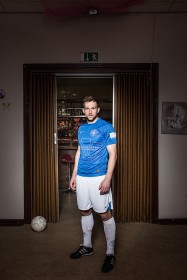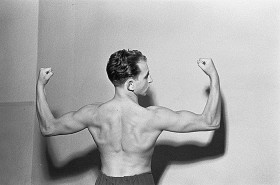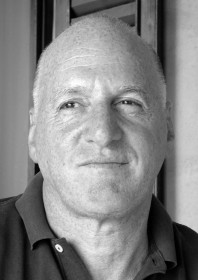The 14th European Maccabi Games (EMG) are beginning tomorrow, 27 July 2015, in Berlin. More than 2,000 Jewish athletes from 36 countries will compete in 19 sports from football to fencing to chess. To accompany the games Tamar Lewinsky and Theresia Ziehe are producing a series of portraits with interviews, introducing a new member of the German delegation from Berlin every day here on the blog. They conducted the interviews on the grounds of the TuS Maccabi in Berlin’s Grunewald where Stephan Pramme also shot the portraits.
Alec-Ilya Pivalov (28), soccer

Alec-Ilya (28), soccer © Jewish Museum Berlin, photo: Stephan Pramme
Alec, why are you taking part in the European Maccabi Games?
It’s a terrific athletic event where you can meet a lot of interesting people from many different countries. By now there’s also a familial atmosphere in the German delegation so it’s just really nice to have the opportunity to participate. And of course it makes you and your family proud.
In 1936, Jewish athletes weren’t permitted to participate in the Olympic Games. Does the fact that some of the competitive events will take place in Berlin’s Olympic grounds – which were built for that Olympics – play a personal role for you?
There is an ambivalence because of course I know the history of this stadium. But in the meantime I associate it with other events: → continue reading
At the Second Zionist Conference on 28 August 1898 in Basel, Switzerland, Max Nordau dedicated a passionate speech to the subject of muscular Judaism. The doctor, publicist and co-founder of the young Zionist movement said:

Herbert Sonnenfeld: Boxer portrait, Berlin 1935
© Jewish Museum Berlin, purchased with funds provided by Stiftung DKLB
“Zionism breathes new life into Judaism. This much I am sure of. It does this morally by refreshing the ideals of the People, physically by the physical education of our offspring, who shall reestablish a bygone muscular Judaism.”
This should therefore not only replace the widespread image of the weak Jew but also support the creation of a new, physically strong “Judaism.” It didn’t take long for this to be realized: just three months following Nordau’s address, the first Jewish sports association was founded in Berlin. It was named Bar Kokhba, after the leader of Judean Jewish resistance against Rome from 132-135 ACE. In a report titled, “Muscular Judaism,” for the new association newspaper, Jüdische Turnzeitung, Nordau described it as the “last, globally historic embodiment of a battle-hardened, weapon-ready Judaism.” He called on Jews to “connect with our oldest traditions: (Then) we’ll again be broad-chested, strong armed, bold-looking men.” → continue reading

The author © David Ranan
For his book, “The shadows of the past are still long: Young Jews on their lives in Germany,” culture researcher, David Ranan, conducted interviews with Jews between 20-40 whose grandparents survived the Holocaust and then settled in Germany after the war. The London-based author will present his book at the Academy of the Jewish Museum Berlin on 7 July 2015, as part of the “New German Stories” series. In advance, we asked him three questions.
Julia Jürgens: Mr. Ranan, one question you asked your interviewees deals with the “packed luggage” the first and second generation seem to have at the ready, an expression of their inner conflict between being able to safely stay or having to again flee. Is there still this conflict within the third generation or how else would you describe its sense of belonging to Germany? → continue reading


